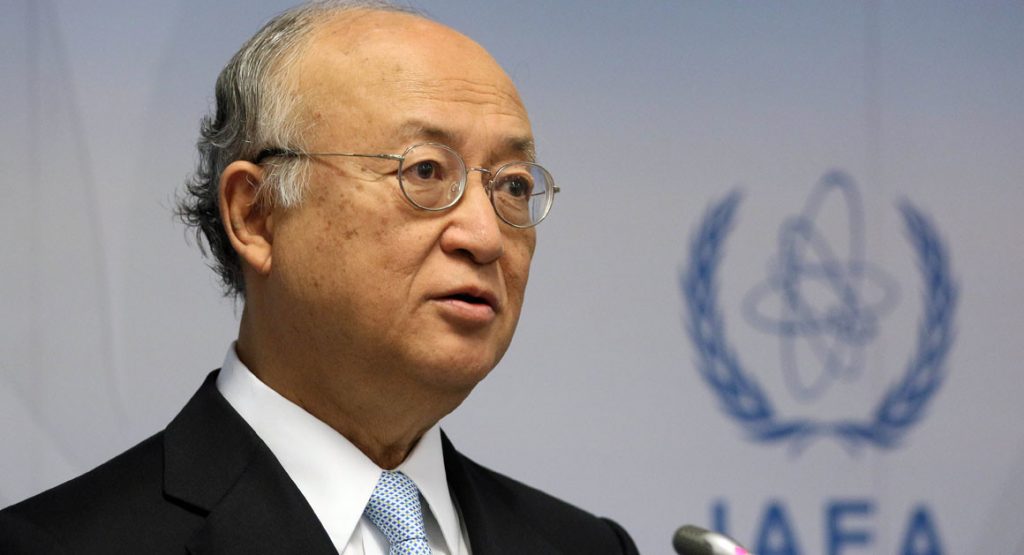Australia/Israel Review
Deconstruction Zone: What the IAEA doesn’t know – or want to know – about Iran’s nuclear program
Nov 5, 2018 | Joshua Block

In his speech to the UN General Assembly on Sept. 28, Israeli Prime Minister Binyamin Netanyahu revealed that Iran, in addition to having an archive of files documenting its illicit military nuclear research, has a warehouse containing nuclear equipment and material. The Prime Minister exhorted International Atomic Energy Agency (IAEA) Director General Yukiya Amano to “go and inspect this atomic warehouse immediately,” before Iran hides its contents.
A week later, however, the IAEA rejected his suggestion. In a statement, the agency said, “All information obtained, including from third parties, is subject to rigorous review and assessed together with other available information to arrive at an independent assessment based on the agency’s own expertise.”
This wasn’t the first time the IAEA failed to investigate possible Iranian violations discovered by Israeli intelligence. When Israel in April smuggled out half a tonne of documents and CDs from a Teheran warehouse, the IAEA issued a similar statement: “In line with standard IAEA practice, the IAEA evaluates all (nuclear) safeguards-relevant information available to it,” but gave no indication that it would investigate further.
Israel subsequently shared many of the files it recovered from Iran with independent weapons experts and selected journalists. The Wall Street Journal assessed in July that the documents showed not only aspects of the Iranian nuclear weapons program the IAEA knew about, but also details “about which international inspectors were unaware.”
Though it is charged with monitoring Iran’s compliance with the nuclear accord, at least twice the IAEA has acknowledged it was not verifying compliance. In September 2017, Amano said the IAEA did not have the tools to verify items listed in Section T of the accord, governing “activities which could contribute to the development of a nuclear explosive device.” David Albright, president of the nonpartisan Institute of Science and International Security and a former weapons inspector, said the statement was an admission that “the deal is not fully implemented.”
In announcing the Iran nuclear deal in January 2016, then US President Barack Obama said Iran couldn’t possibly cheat because the agreement ensured “the most comprehensive, intrusive inspection regime ever negotiated to monitor a nuclear program.” The guarantee for Iran’s full compliance, therefore, was one of the central selling points of the accord. However, critics at the time pointed out that the IAEA did not, in fact, have complete knowledge of Iran’s nuclear weapons program.
In an analysis of the final IAEA report on the past military dimensions of Iran’s nuclear program, Albright observed that, “Iran did not provide the IAEA with anywhere near a full declaration about its past nuclear weapons-related activities, and it did not provide the kind of transparency and cooperation required for the IAEA to conclude its investigation.”
This effectively meant the nuclear watchdog was unable to explain in full Iran’s nuclear weapons activities, including verification that Iran’s nuclear program had been completely dismantled.
The gaps in the IAEA’s knowledge – of Iran’s past nuclear work, of its military sites, of items mentioned in Section T of the nuclear deal, and of the nuclear sites discovered by Israeli intelligence – raise questions about the full extent of Iran’s nuclear program. These gaps are important as we approach November, when US President Trump is imposing sanctions on Iran’s energy sector that could “cripple” its economy.
Defenders of the nuclear deal have argued that the United States is wrong to impose sanctions on Iran because the IAEA confirmed it has been complying with the deal. But with its failure to establish a full picture of Iran’s nuclear ambitions, it can’t be said to have confirmed the country’s compliance; just that Iran didn’t blatantly violate the deal at any site that the IAEA has access to.
When he revealed Iran’s nuclear archive in April, Netanyahu said Iran kept the files to “use them at a later date.” In other words, the gaps in the IAEA’s knowledge of Iran’s nuclear program mean the deal enables Iran to do what Obama said the accord would never allow: develop nuclear weapons.
There is a lot that we don’t know about Iran’s nuclear program. There is a lot we will be unable to know because the deal has too many holes, and the IAEA is unable – or unwilling – to address them.
Joshua S. Block is CEO and president of The Israel Project. He is a former Clinton administration official and spokesman at the State Department’s USAID. © The Israel Project, reprinted by permission, all rights reserved.






